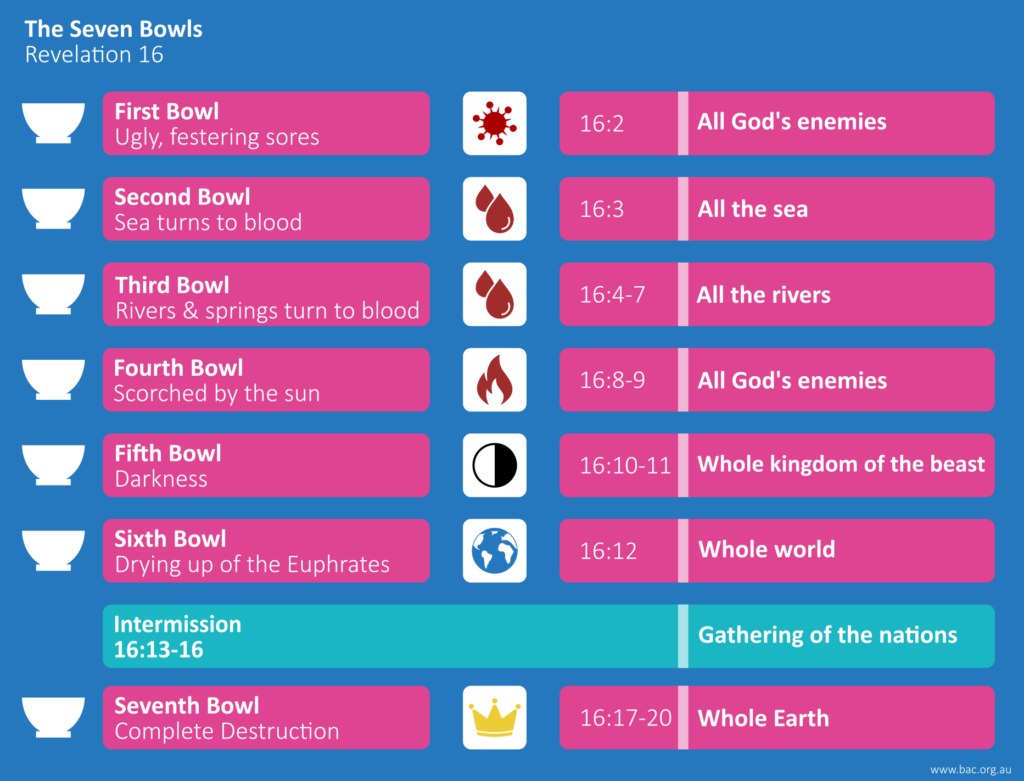Chapter sixteen
Explore: The Seven Bowls of Wrath

We reach the third cycle of seven bowls, after the seven seals and seven trumpets. The bowls continue the sense of escalation, and intensify the drama of the book by building on what has come before.
Whereas the seals and trumpets brought about limited devastation, here it is total and complete. After this, Revelation will turn to describe the final defeat of Babylon (as the representative of all that is evil) and the Beast.
The Seven Bowls of God’s Wrath
16 Then I heard a loud voice from the temple saying to the seven angels, “Go, pour out the seven bowls of God’s wrath on the earth.”
2 The first angel went and poured out his bowl on the land, and ugly, festering sores broke out on the people who had the mark of the beast and worshiped its image.
3 The second angel poured out his bowl on the sea, and it turned into blood like that of a dead person, and every living thing in the sea died.
4 The third angel poured out his bowl on the rivers and springs of water, and they became blood. 5 Then I heard the angel in charge of the waters say:
“You are just in these judgments, O Holy One,
you who are and who were;
6 for they have shed the blood of your holy people and your prophets,
and you have given them blood to drink as they deserve.”
7 And I heard the altar respond:
“Yes, Lord God Almighty,
true and just are your judgments.”
8 The fourth angel poured out his bowl on the sun, and the sun was allowed to scorch people with fire. 9 They were seared by the intense heat and they cursed the name of God, who had control over these plagues, but they refused to repent and glorify him.
10 The fifth angel poured out his bowl on the throne of the beast, and its kingdom was plunged into darkness. People gnawed their tongues in agony 11 and cursed the God of heaven because of their pains and their sores, but they refused to repent of what they had done.
Explore: The Euphrates

In the sixth trumpet, the Euphrates river represented the barrier between the Roman Empire to the West and the Parthian Empire to the East (Revelation 9:14-16). It was symbolic that a more fearsome judgement would come than that of the armies of the Parthians.
At the sixth trumpet, the four angels were released at the Euphrates river, allowing the enormous armies to bring their advance where a third of the people were killed. Here, the river is instead ‘dried up’, which allows the ‘Kings from the East’ to begin advancing with their armies.
After the sixth seal was opened (Revelation 6:12, 15), we saw the kings of the earth, and indeed all of God’s enemies crying out in unison in response to the great judgement that was coming upon them (Revelation 6:16-17). Here at the sixth bowl, we see them gathering together and about to be destroyed.
Rather than being a literal drying up of the river, this verse is echoing that of the sixth trumpet to warn that, whatever they imagine as the more fearsome army, an even greater threat is about to come upon them.
The drying of the river likely also alludes to the parting of the Red Sea in Exodus, another reference to the Exodus story.
12 The sixth angel poured out his bowl on the great river Euphrates, and its water was dried up to prepare the way for the kings from the East. 13 Then I saw three impure spirits that looked like ; they came out of the of the dragon, out of the mouth of the beast and out of the mouth of the false prophet. 14 They are , and they go out to the kings of the whole world, to gather them for the battle on the great day of God Almighty.
15 “Look, I come like a thief! Blessed is the one who stays awake and remains clothed, so as not to go naked and be shamefully exposed.”
16 Then they gathered the kings together to the place that in Hebrew is called Armageddon.
Explore: Armageddon

The kings of the earth were gathered by the counterfeit trinity in Revelation 16:14. We are told that the place they will gather is called Armageddon.
There is much debate about what the term Armageddon means, and whether it is referring to a geographical location, or some other symbolism of its name.
In literal terms, the name means “mount of Megiddo”. Megiddo was an ancient city in Israel, and the location of some significant battles (eg. Judges 5:19; 2 Chronicles 35:20-22). However, it is largely a flat place, and not a mountain of any kind.
Zechariah 12 describes a day when God’s people will come under great attack from the nations. God’s saves his people in dramatic circumstances, leading to an outpouring of weeping that is described as being “as great as the weeping of Hadad Rimmon in the plain of Megiddo” (Zechariah 12:11). Zechariah 12, therefore, sets Megiddo out as the place that the nations will gather in opposition to the people of God – which is what is being described in Revelation 16.
Lastly, in Revelation 9:11, we saw a similar example where the angel of the Abyss, we are told, “whose name in Hebrew is Abaddon”. There, the Hebrew name is important for its symbolic meaning, and that is likely in view here, too. Armageddon is the symbolic place where the nations will gather against the people of God for the ‘final battle’.
17 The seventh angel poured out his bowl into the air, and out of the temple came a loud voice from the throne, saying, “It is done!” 18 Then there came flashes of lightning, rumblings, peals of thunder and a severe earthquake. No earthquake like it has ever occurred since mankind has been on earth, so tremendous was the quake. 19 The great city split into three parts, and the cities of the nations collapsed. God remembered Babylon the Great and gave her the cup filled with the wine of the fury of his wrath. 20 Every island fled away and the mountains could not be found. 21 From the sky huge hailstones, each weighing about a hundred pounds, fell on people. And they cursed God on account of the plague of hail, because the plague was so terrible.
An allusion to Hosea 10:8 is also likely in view here. This was quoted earlier in Revelation 6:16, where the peoples of the earth cried for the mountains and hills to hide them from the judgement of God. Here, there is no escaping as there are no mountains to be found.
Scripture quotations taken from The Holy Bible, New International Version® NIV®
Copyright © 1973, 1978, 1984, 2011 by Biblica, Inc.
Used with permission. All rights reserved worldwide.